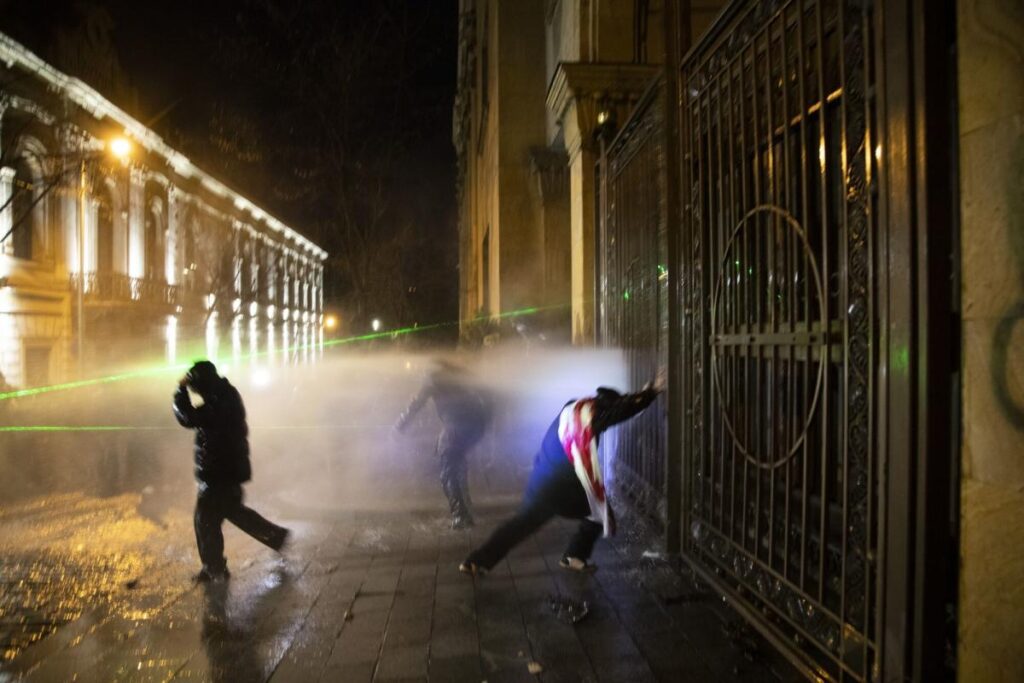Georgia is experiencing a significant political crisis as President Salome Zourabichvili announces her intention to remain in office, challenging the ruling Georgian Dream party’s plan to replace her. During a televised address, Zourabichvili declared the legitimacy of the October parliamentary elections as questionable, implying that without a legitimate parliament, there cannot be a legitimate president. This statement came in the wake of violent protests against the government’s decision to postpone discussions on European Union membership until 2028. The president positioned herself as the last independent institution in the country and took a stand for national unity amidst unrest.
The protests have erupted in Tbilisi, where violent confrontations between demonstrators and police have resulted in the detainment of at least 107 individuals, with numerous injuries reported among both protesters and journalists. The police have faced criticism for their aggressive tactics, prompting Zourabichvili to hold the law enforcement leadership accountable for the violence. Meanwhile, Prime Minister Irakli Kobakhidze, representing the ruling party, suggested that the protests were incited by “radicals and their foreign chiefs,” underscoring a narrative of external influence aimed at destabilizing the nation. He called for an end to foreign support for protests which he views as detrimental to Georgia’s European integration process.
Kobakhidze’s comments highlight the Georgians’ fears of an uprising akin to Ukraine’s 2013 Maidan protests, where citizens ousted their president over similar concerns regarding European ties. In a critical political move, the Georgian Dream party has nominated Mikheil Kavelashvili, a former athlete, as their presidential candidate in the upcoming elections, effectively aiming to position a successor to the pro-European Zourabichvili. The new presidential role, while largely ceremonial, will be filled by an Electoral College following recent constitutional amendments, shifting the dynamics of power within the country.
The political landscape has been tumultuous since the parliamentary elections, which saw the ruling party secure an extension of its 12-year governance. Opposition party members, claiming electoral fraud, have chosen to boycott the newly formed parliament and continue organizing demonstrations to express their dissent. The unfolding events reflect a growing division within Georgian society, where pro-European sentiments clash with the ruling party’s ongoing narrative of stability and strong institutions. The recent tensions have reignited calls for protests in the capital as opposition leaders mobilize support to challenge the legitimacy of the elections and the government.
Georgia’s pursuit of EU membership, initiated alongside Ukraine and Moldova in 2022, adds complexity to the current crisis. The postponement of discussions regarding EU accession has been met with widespread condemnation from civil society and opposition groups, fostering an environment of mistrust in the government. The discord between the ruling party’s political maneuvers and the aspirations of many Georgians for closer ties with the European Union encapsulates the ongoing struggle for democratic governance in the country. Escalating tensions are likely to continue, as both sides deem their positions as essential to the future of Georgian democracy.
As protests continue, the situation remains precarious, with potential implications for regional stability and international relations. The Georgian Dream party’s insistence on its legitimacy juxtaposed against the growing discontent from opposition factions raises pressing questions about the future of governance in Georgia. How the government and the president will navigate this turbulent period remains uncertain, but the call for unity and legitimacy underscores the urgency of addressing concerns regarding democratic processes in Georgia. The next phase of political developments will be crucial in determining whether the country can reconcile its divergent paths toward Europe or if it faces an extended period of unrest.

